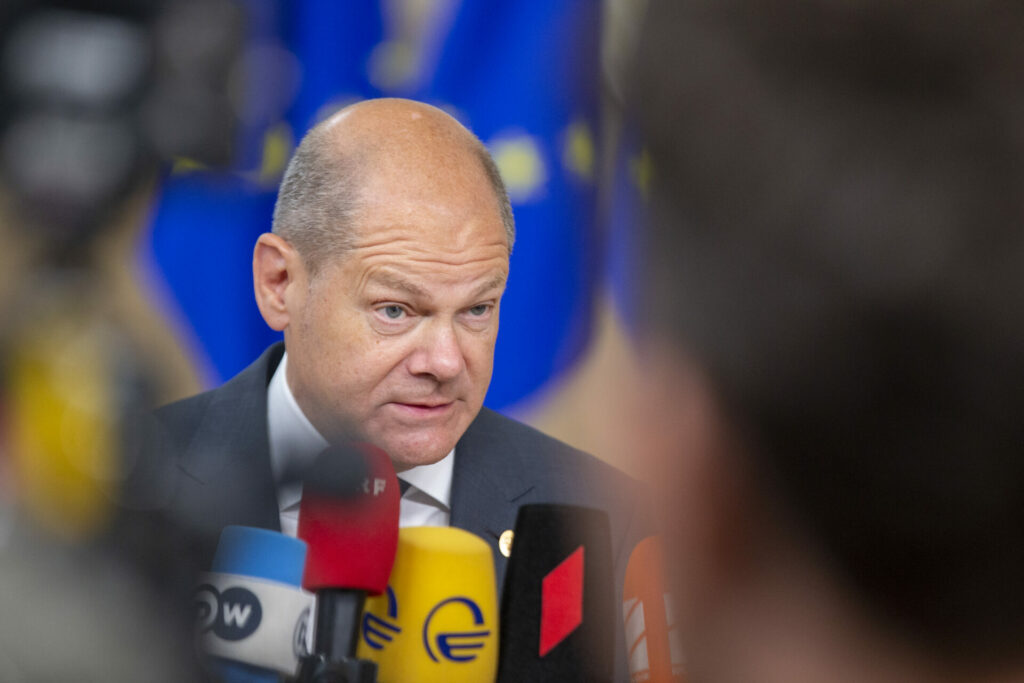BEHIND THE SCENES
Weekly analysis and untold stories
With SAM MORGAN
Obvious answers
EU leaders met this week to hash out a response to the ongoing energy crisis and rampant inflation that threatens to wipe out households’ savings this winter. The German government, for all its faults, has possibly inadvertently come up with the best solution for these woes.
A euro buys you less of most things than it did a year ago—pound sterling excluded—and without urgent action, it will buy even less in just a few short months. Heating homes and putting food on the table could become an either/or choice for many.
Governments have been trying to react to the crisis each in their own unique ways, by subsidising energy bills, rewriting tax rules and, only in some rare cases, thinking long-term about issues like building renovations.
Now, regular readers of Behind the Scenes will know that this column’s author is a big fan of joint borrowing, the ‘Occam’s razor’ of EU policymaking that is all too often the obvious answer to an obvious question.
The EU is carrying it out to great effect as part of its pandemic recovery fund: distributing €800 billion in grants and cheap loans to the 27—well, 26 not including Hungary—member states and keeping tabs on how it is spent.
Most politicians insisted that this was a one-time deal, not to be repeated. A big injection of capital and then governments would have to go back to business as usual, reducing deficits, implementing reforms and so on. But the world has changed dramatically (again).
BRUSSELS BEHIND THE SCENES is a weekly newsletter which brings the untold stories about the characters driving the policies affecting our lives. Analysis not found anywhere else, Sam Morgan helps you make sense of what is happening in Brussels. If you want to receive Brussels behind the scenes straight to your inbox every week, subscribe to the newsletter here.
Germany, one of the main opponents of joint borrowing, which only came around to the first wave of Covid spending after intense political pressure eventually told and enough assurances were made that this really was a one-off, may have triggered a big rethink.
Its government has announced a mammoth €200 billion relief package, the nitty-gritty details of which are still to be defined, and is still largely opposing EU plans to put a cap on gas prices. This has made Berlin quite unpopular.
Reactions in other capitals has ranged from worrying about distorting the single market to denouncing the German billions as “cannibalistic”, as governments with far less borrowing power take Germany to task.
The EU Commission, feared by many to be a glorified ministry of the German government because its president hails from that country, has even reacted via two of its most influential officials.
Commissioners Thierry Breton and Paolo Gentiloni, although not naming Germany directly, issued a call for more financial solidarity and mutualised debt in some form so that every one of the member states receives aid, not just the wealthier nations.
As Bloomberg reports, the idea of going to the capital markets and using the Commission’s triple-A rated status to source more funding is now being actively discussed. What form it would take is still up in the air.
But the template exists and early results indicate that the Covid fund and SURE unemployment initiative are proving to be a success. Now it just needs political backing to be repeated. Berlin is certainly not on board yet.
That is because Germany insists no wrong has been done and that its relief plan has been “misunderstood”, as it will be spread out over more than two years, making it equitable to what other countries have actually decided to invest.
Not everyone in the Commission is as enthusiastic about more joint debt either. Economy boss Valdis Dombrovskis is also maintaining a hawkish stance, while powerful competition chief Margrethe Vestager is yet to show her hand about Germany’s subsidies.
Leaders only met for an informal summit this week, as is tradition under the rotating EU presidency, so a full-fat meeting later this month will be the crucible in which all these ideas are tested.
If diplomat utterings are anything to go by, then there is a majority of grumblers that do not like what Germany has done and a blocking minority that does not want anymore common debt in any form.
The two issues will become even more intertwined in the coming weeks and months, meaning that one possible outcome is Germany agreeing to some more joint borrowing in exchange for its €200 billion getting the green light.
Without Berlin fighting its corner, whatever frugal countries oppose more debt will likely quickly fall apart, leaving the path clear for the Commission to do its thing. Berlin and the others will of course insist on lots of strings for whatever mutualisation is agreed.
More importantly than all of this though is one simple conclusion based on relatively recent history: there is little appetite in Europe on the part of national governments to work towards a common good, it is all about vested interests.
There is little to suggest that this unpleasant status quo will be changing anytime soon.
BRUSSELS BEHIND THE SCENES is a weekly newsletter which brings the untold stories about the characters driving the policies affecting our lives. Analysis not found anywhere else, Sam Morgan helps you make sense of what is happening in Brussels. If you want to receive Brussels behind the scenes straight to your inbox every week, subscribe to the newsletter here.

